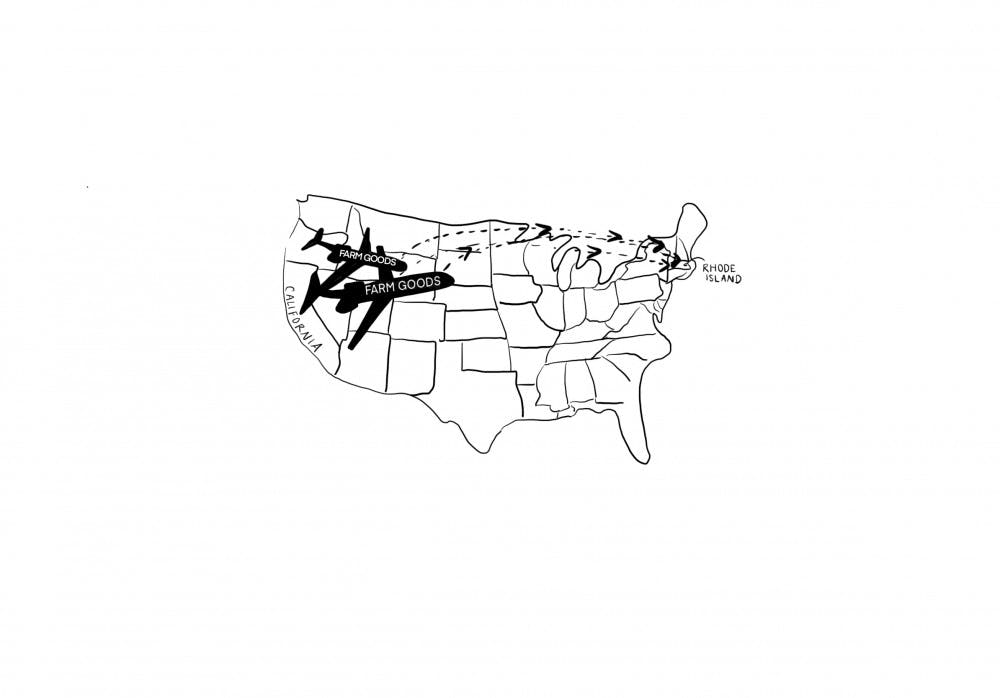Passersby of a windowless building tucked away in North Providence might not immediately assume that it contains a sustainable farm producing microgreens and shoots. But this building is home to Sprout Organic Farms, a business founded in 2018 that aims to produce food in a setting that can exist regardless of the outdoor conditions. With the effects of climate change becoming ever more apparent — from wildfires in California to flooding in the Midwest — the indoor farm is just one example of Rhode Islanders turning their focuses to sustainability in food production.
“I’m not as vulnerable as traditional farms to heat waves and things like that,” said Aaron Damus, co-founder of Sprout. While indoor farms may not be the only answer to the effects of climate change on food, “they are a really good piece of the farming puzzle,” he added.
Sprout, which currently supplies ingredients for the Nitro Cart sandwiches, will also provide some to Ceremony Tea, the establishment set to replace Tealuxe on Thayer Street. This Rhode Island-based food sourcing is just one example of a national trend toward locally sourced food. But in Rhode Island, imports still dominate the food economy — with less than 5 percent of the state’s food consumption coming from its own resources, according to EcoRI.
“We should have the resources closer to home, to put back into the economy and to ensure that we are getting the healthiest food that we can,” Damus said.
Without a large volume of locally sourced food, Rhode Island is dependent on other regions, such as California and the Midwest, for its food supply, according to EcoRI. But even those areas are becoming increasingly unreliable.
“A lot of the places we currently rely on for food are already experiencing, like Rhode Island is, the disastrous impacts of climate change,” said Sue Anderbois, director for food strategy for the Rhode Island Commerce Corporation.
Damus started Sprout with the national effects of climate change in mind. “With climate change happening, the ability to eliminate as much dependency on some of those more volatile areas is going to be key to figuring out how to grow really fresh and really nutritious food close to the end user,” he added.
In the United States, a large portion of the food supply is grown in a small number of states, Damus said. Not only is being reliant on other states potentially risky, but importing food over long distances can also increase greenhouse gas emissions, added Kobi Weinberg ’20, whose thesis focuses on distributing locally sourced food to lower-income communities. Damus agreed, characterizing food production in America as having a “massive carbon footprint.”
With the reality of climate change looming, many players in the state are focused on how to increase local food production.
“We are working on ways to support local agriculture, local fisheries and local bakers,” Anderbois said. The state is also focused on its treatment of farmers, with Anderbois saying that Rhode Island is “a national leader in the percentage of income that our farmers make from direct-to-consumer sales,” which include things like farmers markets and farm stands, she said.
Gov. Gina Raimondo, D-RI, also launched Relish Rhody in May 2017, outlining a set of goals that include preserving and growing agriculture and fisheries in the state, expanding direct-to-consumer sales opportunities and having half of the food consumed in New England be regionally produced by 2060, according to its website.
When it comes to what individuals can do, Anderbois stressed the importance of purchasing power. One of the best ways to support local food producers is buying their product, she said. “It’s one thing to be like ‘I love local farms’ and then only shop at places that don’t sell local products. That’s not helpful.”
Weinberg agreed. “It’s on individuals who have the means to consume local produce to put that in their head space. It stimulates that economic component — putting money back into the community,” he said.
Rhode Islanders can also act by showing support at the state level for locally-sourced food and grant programs that fund these endeavors, Anderbois added. Making sure the governor and general assembly “know that this is a priority and you want to see that these types of programs (are) fully funded is how our democracy works,” she said.





